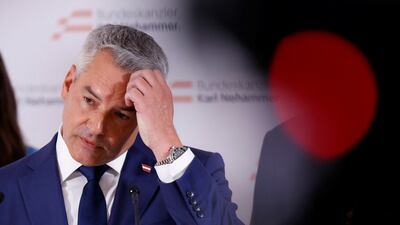Austria's Chancellor Karl Nehammer said he will step down as head of the government and chairman of the conservative People’s Party after failing to form a new coalition following September elections.
The move might lead to a snap election or the conservatives might now try to negotiate with the far-right party that won the most votes in September.
So far, all parties have refused to consider forming a government with the pro-Russia, anti-migration Freedom Party (FP) and its leader, Herbert Kickl.
Efforts to form a centrist coalition had narrowed down to talks between the conservatives and the Social Democrats after the liberal Neos abandoned talks earlier in the week.
And then on Saturday, Mr Nehammer announced on X: “An agreement has not been possible on significant core issues. I will step down as chancellor as well as leader of the People’s Party in the following days, and facilitate an orderly handover.”
The FP won the parliamentary election held in September with 29 per cent of the vote, but that was not enough to rule alone in Austria’s system that routinely governs through coalitions.
It would have needed a coalition partner to govern and Mr Nehammer, and the other main parties, ruled out governing with the FP.
The conservative People's Party came second with 26.3 per cent, while the centre-left Social Democrats won 21.1 per cent.
Social Democrat leader Andreas Babler said he feared their failure would now give the Freedom Party a chance to become a coalition partner.
“We know what threatens to happen now. [A Freedom Party-People Party] government with a right-wing extremist chancellor that will endanger our democracy on many points,” Andreas Babler, the leader of the Social Democrats, said.
He praised Mr Nehammer’s conduct during negotiations, but criticised the chancellor’s party.
The aim had been to sideline the Freedom Party that topped the vote. Since the election, the FP has also gained support with opinion polls showing a 10-point lead over the People's Party and the Social Democrats.
In its election programme, titled Fortress Austria, the FP called for “remigration of uninvited foreigners”, for achieving a more “homogeneous” nation by tightly controlling borders and suspending the right to asylum seeker status with an “emergency law”.
The FP also called for an end to sanctions against Russia and is highly critical of western military aid to Ukraine.


